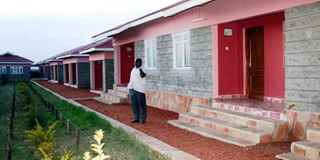How Sh5 salary from firewood job helped found lucrative hotel

Kipeen ole Sayialel owns three booming tourist hotels, including the prestigious Riverside Campsite Resort in Maasai Mara Game Reserve and Loita Plains Hotel in Majimoto, along the Narok-Sikinani Road. PHOTO/GEORGE SYAGIE
What you need to know:
- Kipeen, 69, has risen from earning Sh5 a month fetching firewood for colonial settlers in 1952 to become a successful businessman in the hotel industry in the Masai Mara game reserve.
- The former Majimoto location chief now owns three booming tourist hotels.
- He challenges young people in the region, which is mainly dependent on livestock rearing, to start their own firms.
The first thing that strikes you when you meet Kipeen ole Sayialel is his sharp business acumen.
Kipeen, 69, has risen from earning Sh5 a month fetching firewood for colonial settlers in 1952 to become a successful businessman in the hotel industry in the Masai Mara game reserve.
His hotel businesses are fast closing in on Sh500 million mark in worth, which he realised from saving most of his monthly salary of Sh5 a month for 22 years.
His road to entrepreneurial success has been long and winding, starting out as a labourer for a group of white settlers making cream in Narok County. He used to fetch firewood for them to light boilers in their creameries.
The former Majimoto location chief now owns three booming tourist hotels, including the prestigious Riverside Campsite Resort in Maasai Mara Game Reserve and Loita Plains Hotel in Majimoto, along the Narok-Sikinani Road.
“I always wanted to be a successful businessman,” says Kipeen, who is also chairman of Olare Orok Conservancy, and Olkiombo Group Ranch that houses a hotel business owned by the family of President Uhuru Kenyatta.
“I denied myself all pleasure and saved most of my earnings from 1952 to 1974. That is when I quit employment and ventured into business, mainly buying and selling cattle,” says Kipeen.
The father of 15 children and three wives says his background — his father had six wives — challenged him to do something that would earn him a living and help take care of his mother, who was the youngest wife.
“At that time, my age group was making a living through cattle rustling on the Kenya-Tanzania border and enjoying moranism and the goodies that go with it. But I decided to avoid illicit trade and pastoralism,” he says.
In 1974, with no formal education, he had Sh310. That was enough capital to start a business. He resigned from his firewood fetching job and started buying and selling cows.
“I had this feeling that I could succeed. Since I made Sh1,000-2,000 selling cows, I knew I could do much better with higher capital investment,” says Kipeen.
As his income grew, he began saving in a bank. Later, he was employed as a casual worker at the now defunct Narok County Council to collect revenue at the gates of the Masai Mara reserve.
This became a good platform to launch his hotel business. He opened his first hotel in the Masai Mara just 2km from the Talek gate.
“There were unexploited opportunities. Competition was not very high. I used to charge Sh30 per visitor for an overnight stay at my campsite,’ he recalls.
“I carried out a survey on my farm at Majimoto, on the Ewuaso Ngiro-Maasai Mara Road, and saw a perfect opportunity to start a tourist facility — the Loita Plains Motel,” he says.
His venture also benefits from the annual wildebeest migration from the Serengeti in Tanzania to the Masai Mara Reserve, with the hotel hosting extra visitors when accommodation is limited.
The motel is set in a quiet, serene location and has self contained rooms, swimming pool, and a picnic site. These attract tourists and honeymooners.
He challenges young people in the region, which is mainly dependent on livestock rearing, to start their own firms.
“The bottom line of going to school is to live a good life later on.
A good life requires money and good money can be found only in business.
As an employee, you will never make more money than your employer.
You can only do that if you go into business and become your own boss,” he says.





